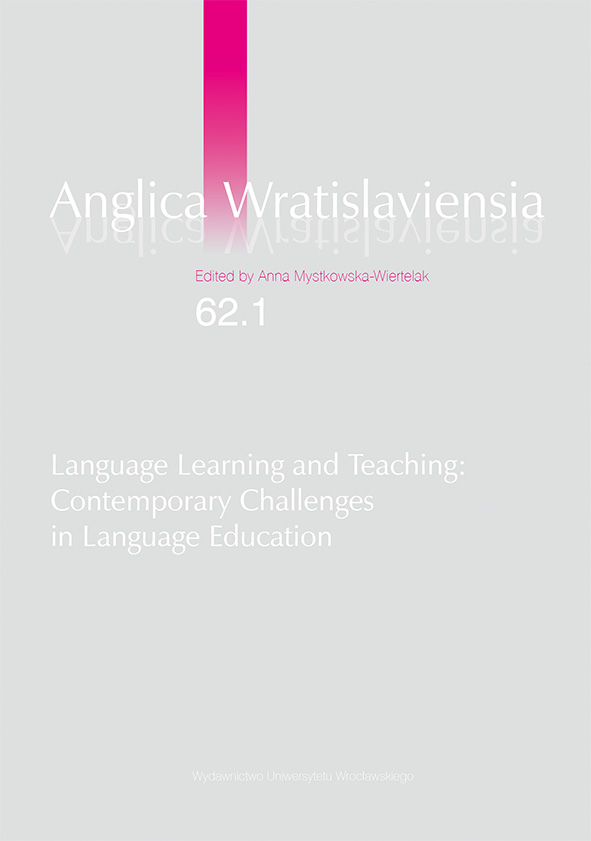

Articles

Learner-centred education has emphasized the significance of learner autonomy in language learning over the past forty years. Currently, the literature on the topic implies that cultural and educational environments affect autonomous learning perception and practice, therefore students’ readiness must be examined before creating autonomous learning activities. Given the scarcity of studies, the purpose of this research is to shed light on the issue of whether older adult learners of English as a Foreign Language (EFL) are ready for learner autonomy. To achieve this goal, the present study collected responses from sixty-five EFL learners, aged between sixty and eighty-six. The data were obtained through a questionnaire consisting of five sections: background information, views on teacher and student responsibilities, decision-making skills, motivation, and autonomous activities both within and outside the classroom. Furthermore, eight voluntary EFL learners participated in the follow-up interviews. The analysis involved utilizing descriptive statistics from the questionnaire replies, as well as interpreting the interview data. The findings revealed that Turkish older adult EFL learners exhibited a limited degree of readiness for autonomous language learn- ing, despite their notable levels of enthusiasm and eagerness to improve their English proficiency.
Alrabai, F. 2017. “From Teacher Dependency to Learner Independence: A Study of Saudi Learners’ Readiness for Autonomous Learning of English as a Foreign Language.” Learning and Teaching in Higher Education: Gulf Perspectives 14.1. 70–97.
Benson, P. 2007. “Autonomy in Language Teaching and Learning.” Language Teaching 40.1. 21–40.
Chan, V. 2001. “Readiness for Learner Autonomy: What Do Our Learners Tell Us?” Teaching in Higher Education 6.4. 505–18.
Chan, V., M. Spratt and G. Humphreys. 2002. “Autonomous Language Learning: Hong Kong Tertiary Students’ Attitudes and Behaviours.” Evaluation & Research in Education 16.1. 1–8.
Cirocki, A., S. Anam and P. Retnaningdyah. 2019. “Readiness for Autonomy in English Language Learning: The Case of Indonesian High School Students.” Iranian Journal of Language Teaching Research 7.2. 1–18.
Cotterall, S. 1995. “Readiness for Autonomy: Investigating Learner Beliefs.” System 23.2. 195–205.
Dam, L. 1995. Learner Autonomy 3: From Theory to Classroom Practice. Dublin: Authentik.
Deci, E. and R. M. Ryan. 2013. Intrinsic Motivation and Self-Determination in Human Behavior. New York: Springer.
Hakuta, K., E. Bialystok and E. Wiley. 2003. “Critical Evidence: A Test of the Critical-Period Hypothesis for Second-Language Acquisition.” Psychological Science 14.1. 31–38.
Holec, H. 1979. Autonomy and Foreign Language Learning. Oxford: Pergamon Press.
Jaroszewska, A. 2013. Nauczanie języków obcych seniorów w Polsce. Analiza potrzeb i możliwości w aspekcie międzykulturowym. Kraków: Impuls.
Karabıyık, A. 2008. The Relationship Between Culture of Learning and Turkish University Preparatory Students’ Readiness for Learner Autonomy. Diss. Bilkent U.
Kartal, G. and C. Balçikanlı. 2019. “Tracking the Culture of Learning and Readiness for Learner Autonomy in a Turkish Context.” TEFLIN Journal: A Publication on the Teaching and Learning of English 30.1. 22–46.
Klimova, B. and K. Kuca. 2015. “Alzheimer’s Disease: Potential Preventive, Non-Invasive, Intervention Strategies in Lowering the Risk of Cognitive Decline—A Review Study.” Journal of Applied Biomedicine 13.4. 257–61.
Koçak, A. 2003. A Study on Learners’ Readiness for Autonomous Learning of English as a Foreign Language. Diss. Middle East Technical U.
Lin, L. and H. Reinders. 2019. “Students’ and Teachers’ Readiness for Autonomy: Beliefs and Practices in Developing Autonomy in the Chinese Context.” Asia Pacific Education Review 20. 69–89.
Little, D. 1991. “Learner Autonomy 1: Definitions, Issues and Problems. Authentic Language Learning.” Resources 86.11. 15–22.
Little, D. 2007. “Language Learner Autonomy: Some Fundamental Considerations Revisited.” International Journal of Innovation in Language Learning and Teaching 1.1. 14–29.
Littlewood, W. 1999. “Defining and Developing Autonomy in East Asian Contexts.” Applied Linguistics 20.1. 71–94.
McElree, B. and L. Dyer. “Beyond Capacity: The Role of Memory Processes in Building Linguistic Structure in Real Time.” In: Sanz, M., I. Laka, and M. K. Tanenhaus (eds.). Language Down the Garden Path: The Cognitive and Biological Basis for Linguistic Structures. Oxford: Oxford UP, 229–40.
Noyan, E. and A. Aşık. 2024. “Challenges of Learning English in Late Adulthood: The Case of Online Learning.” International Journal of Educational Spectrum 6.1. 43–65.
Ramírez-Gómez, D. 2016a. “Critical Geragogy and Foreign Language Learning: An Exploratory Application.” Educational Gerontology 42.2. 136–43.
Ramírez-Gómez, D. 2016b. Language Teaching and the Older Adult: The Significance of Experience. Bristol: Multilingual Matters.
Schiller, E., H. Dorner and Z. A. Szabó. 2023. “Developing Older Adults’ Learner Autonomy through One-to-One Counselling: Results of an Exploratory Investigation.” System 115. 103030.
Scott, M. L. 1994. “Auditory Memory and Perception in Younger and Older Adult Second Language Learners.” Studies in Second Language Acquisition 16.3. 263–81.
Singleton, D. 2017. ““Language Aptitude: Desirable Trait or Acquirable Attribute?” Studies in Second Language Learning and Teaching 7.1. 89–103.
Singleton, D. and J. Leśniewska. 2021. “The Critical Period Hypothesis for L2 Acquisition: An Un- falsifiable Embarrassment?” Languages 6.3. 149.
Singleton, D. and L. Ryan. 2004. Language Acquisition: The Age Factor. Clevedon: Multilingual Matters.
Słowik, A. 2016. “Adult Learners and the Use of L1 in the Foreign Language Classroom.” Anglica Wratislaviensia 54. 107–24.
Słowik, A. 2019. “Developing Efficient Foreign Language Classroom Environment for Older Adult Learners.” The Journal of Education, Culture, and Society 10.2. 189–200.
Tayjasanant, C. and S. Suraratdecha. 2017. “Thai EFL Teachers and Learners’ Beliefs and Readiness for Autonomous Learning.” 3L, Language, Linguistics, Literature 22.3.
World Health Organization. 2022, October 1. “Ageing and Health.” Retrieved from www.who.int/news-room/fact-sheets/detail/ageing-and-health. 1 Feb. 2024.
Yıldırım, Ö. 2008. “Turkish EFL Learners’ Readiness for Learner Autonomy.” Journal of Language and Linguistic Studies 4.1. 65–80.